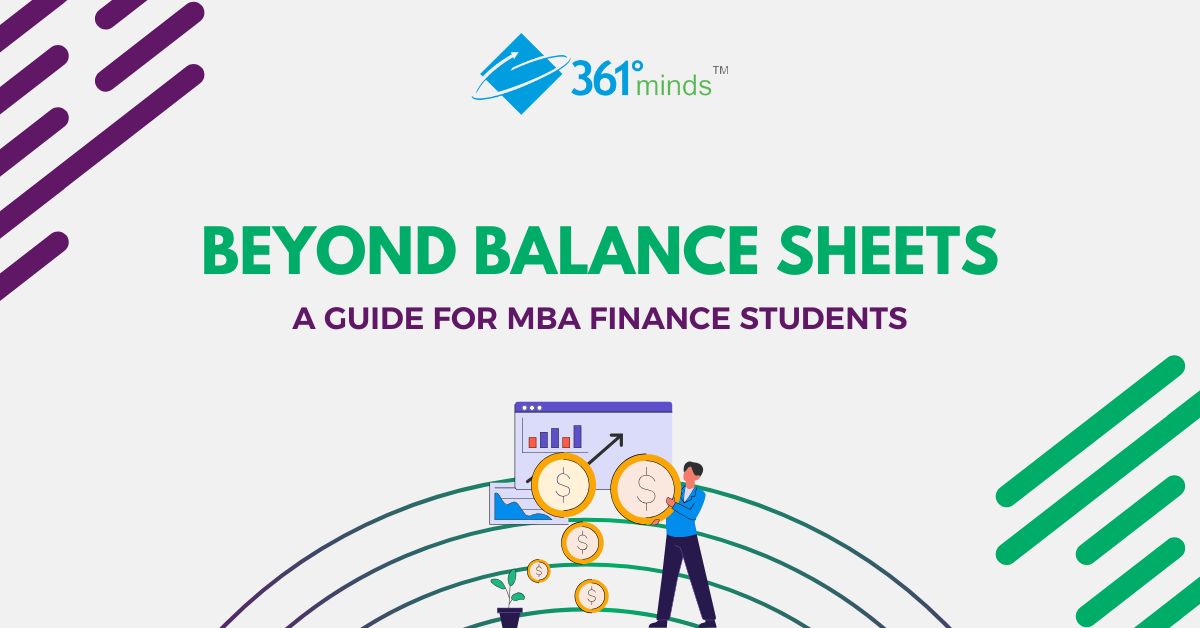Beyond Balance Sheets: A Guide for MBA Finance Students
You are now enrolled in your MBA program in finance. You have studied more Harvard case studies than you’ve eaten hot food, you can talk fluently about EBITDA, and you casually use words like “DCF.”
However, what if we told you that your curriculum does not include some of the most important financial lessons?
Now here is a rather irreverential but practical behind-the-scenes look at the practical side of finance that isn’t typically covered in textbooks and classrooms.
1. PowerPoint is your third language, and Excel is your second.
Even if you may be an expert in finance theory, Excel is used in the real world for purposes other than creating to-do lists.
What you truly require:
- Keyboard shortcuts that give you a Jedi appearance.
- Summarizing 10,000 rows with pivot tables is as easy as pie.
- You can prevent accounting heart attacks by using conditional formatting.
- Financial models that are clean enough for even your boss’s boss to read.
And after the completion of that masterpiece? It goes into PowerPoint. Because the deck is the driver and the model is the engine.
2. Keeping Alert While Reading Financial News
Indeed, The Economic Times and Bloomberg are more than merely MBA décor.
What should be created:
- A practice of keeping up with macro data and developments on the world market.
- Being able to defend interest rate increases without coming across as a central banker.
- Knowledge of the real market effects of gasoline costs, geopolitical risk, and governmental policies.
Hot tip: You’re doing great if your market update doesn’t bore a friend to tears.
3. How to Communicate in “Client-ese”
Numbers are only one aspect of finance. It’s dialogue.
Things to become proficient in:
- Converting difficult financial jargon into commonplace terms.
- Constructing numbers into stories that clients can understand.
- It’s important to learn how to explain “your strategy is flawed” without upsetting the executives in the room.
Because if you can’t get people to care about your model, it doesn’t matter how good it is.
4. Overcoming the Spreadsheet Crisis at Two A.M.
Long hours and erratic nights are part of some jobs (cough, investment banking cough).
What you will experience:
- Prototypes that malfunction right before a board meeting.
- Minutes before a presentation, pitch decks are edited.
- Your new blood type is coffee.
Indeed, it appears that debating font sizes at one in the morning is a valid life skill.
5. Tax Understanding: The Tough But Important Part
Although taxes may seem dull, misinterpreting them can seriously harm your finances and predictions.
Things to review:
- Indian tax system: capital gains, GST, and corporation tax.
- Fundamental international tax laws if you want to work abroad.
- Tax-saving tools, since you’ll be grateful later.
In summary, be aware of taxes. Or know someone who does, at the very least.
6. The Real Movement of Money
Ignore the chapter on the theoretical “flow of funds.” Finance in real life is messier.
Things you won’t discover in class:
- The confusion caused by late vendor payments.
- Even if the P&I appears to be good, cash flow is what makes or breaks a corporation.
- The peculiarities of working capital cycles, credit terms, and banking operations.
Warning: All CFOs are essentially expert jugglers.
7. Behavioral Finance: Due to the Oddness of Humans
According to the textbook, markets are logical. The press reports otherwise.
Things to look out for:
- Panic selling when the volatility is low.
- Overconfidence in times of market expansion.
- Among the wonderful cognitive biases are fomo, herd mentality, and others.
In the finance industry, interpreting people is just as important as modeling numbers.
8. Personal Finance for MBAs in Finance (Really)
An organization in the Fortune 500 can be valued. But are you able to handle your own pay?
To clarify:
- Yesterday was the start of that SIP.
- Budgeting is a skill that Excel can help you with.
- Recognize insurance policies, credit cards, and CIBIL scores.
- Diversify your investments; don’t place all of your money on gold coins, cryptocurrency, or your cousin’s startup.
Because it’s plain ironic to be broke while holding an MBA in finance.
9. Making Connections Without Being Awkward
Gathering business cards isn’t the goal of networking. It’s about establishing connections.
What functions:
- Posing intelligent, sincere queries.
- Yes, that too, listening.
- Maintaining communication without coming out as desperate.
- Being helpful without anticipating a quick return.
LinkedIn and MBA events are your playgrounds; act like a person, not a machine.
10. Ethics: You Shouldn’t Just Do It Because You Can
Do you recall which pages of the textbook you skipped before the tests? “Business Ethics” ones, that is? They do matter, it turns out.
Genuine conversation:
- In the world of finance, integrity is currency.
- Reputation spreads more quickly than profits.
- It is one thing to take shortcuts in Excel macros, but it is quite another to do so on financial statements.
- The objective is to do good, not simply well, and get some sleep at night.
Conclusion
You get the tools with a finance master’s degree. You learn how to use them in real life. You’ll do better in your profession and beyond if you can learn to combine technical proficiency with sound judgment, communication, and streetwise instincts.
So, certainly, read the textbooks. Read between the lines as well. The magic takes place there.


